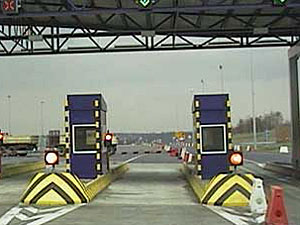Audio
Photos
More from MPR
Your Voice
| |||||||||||||||||||||||||||||||||||||||||||||||||||||||
Lawmakers want to put brakes on toll road plan
February 24, 2004
The state transportation department has given notice that it will move ahead with plans to authorize new toll lanes in Minnesota. The plan would invite private companies to finance new lanes by charging tolls. But a group of state lawmakers is asking MnDOT officials to move cautiously, and is proposing greater oversight of the process.
St. Paul, Minn. — Minnesota Transportation officials are inviting interested companies to a discussion next week on how to proceed with so-called FAST lanes. The toll lanes would be paid for by the drivers who use them. When construction costs are recovered, the lanes would revert to state ownership.
MnDOT has already outlined an ambitious schedule for moving forward that includes a formal request for proposals in May and new construction by 2005. That prospect has alarmed some lawmakers who worry that the department is operating with no oversight from the Legislature or the public.
 | |||
Sen. Scott Dibble says toll lane projects that attract private investors won't necessarily be those that serve the state's overall transportation needs. And the Minneapolis DFLer says it's imperative that the public be represented at any discussions.
"MnDOT is a big agency. And it's accountable to the larger public, and we represent the larger public. And we're just looking for an opportunity for the public to come in and have a conversation. It's the traveling public; it's this region; it's everyone has a stake in a major decision like this," he says.
Gary Thompson, the director of innovative construction at MnDOT, says the department intends to seek public input, and he says the development outline is only a rough sketch and certain to evolve. In particular, Thompson says MnDOT will ensure that any FAST lanes fit into the agency's broader transportation picture.
"We're not going to build something that really doesn't fit our overall strategies and transportation plan. That's not the idea at all. We're interested in what developers have to say about particular projects and we'll compare that against what our overall plan is," Thompson says.
Dibble and others, however, are introducing legislation that requires the department to integrate its toll proposals with existing transportation plans. The legislation would also restrict "non-compete" clauses. Dibble says that in other states, the private contractors that build and manage the toll lanes have been assured that no other roadways or transit alternatives will be built that might compete with the private toll lane for ridership.
Rep. Frank Hornstein, DFL-Minneapolis, says such clauses would tie the state's hands in unacceptable ways, and would do so for as long as the tolls were paying off the construction costs.
"One of those clauses could very well say, 'You cannot do transit on this corridor.' That goes in the opposite direction of where we need to go in transportation policy in this state," Hornstein says.
MnDOT documents indicate that the agency would allow non-compete, but Thompson says that doesn't mean they'll be used. He says the agency is breaking new ground with the FAST lanes proposal and will take advice from all sides on how to proceed.
"The Pawlenty-Molnau administration has made a decision that we should take a serious look at FAST lanes in Minnesota. And that's what we're doing at this point. And we realize that there's a lot of hoops that we have to jump through before we get to where we're going," he says.
The proposed legislation would add another set of hoops by establishing a legislative review process. Thompson says he can't say whether the proposed legislation would help or not, but he says he acknowledges the need for deliberation.
|
News Headlines
|
Related Subjects
|


